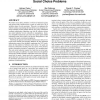Free Online Productivity Tools
i2Speak
i2Symbol
i2OCR
iTex2Img
iWeb2Print
iWeb2Shot
i2Type
iPdf2Split
iPdf2Merge
i2Bopomofo
i2Arabic
i2Style
i2Image
i2PDF
iLatex2Rtf
Sci2ools
110
click to vote
ATAL
2006
Springer
2006
Springer
MDPOP: faithful distributed implementation of efficient social choice problems
We model social choice problems in which self interested agents with private utility functions have to agree on values for a set of variables subject to side constraints. The goal is to implement the efficient solution, maximizing the total utility across all agents. Existing techniques for this problem fall into two groups. Distributed constraint optimization algorithms can find the solution without any central authority but are vulnerable to manipulation. Incentive compatible mechanisms can ensure that agents report truthful information about their utilities and prevent manipulation of the outcome but require centralized computation. Following the agenda of distributed implementation [16], we integrate these methods and introduce MDPOP, the first distributed optimization protocol that faithfully implements the VCG mechanism for this problem of efficient social choice. No agent can benefit by unilaterally deviating from any aspect of the protocol, neither information-revelation, comp...
ATAL 2006 | Distributed Constraint Optimization | Intelligent Agents | Interested Agents | Social Choice |
| Added | 20 Aug 2010 |
| Updated | 20 Aug 2010 |
| Type | Conference |
| Year | 2006 |
| Where | ATAL |
| Authors | Adrian Petcu, Boi Faltings, David C. Parkes |
Comments (0)

